Read these chess tips for beginners to understand how chess players feel and think. If you make your chess moves without following any chess principles you will lose quickly and you don’t even understand why you have lost. There are no cheap chess tricks to learn but fundamental chess principles that you have to apply all the time.
The chess tips on my website help you to improve your chess strategy and finally start winning. To get better you need mental discipline, patience and knowledge.
To get a feel of your chess strenght play against these chess programs here. You will find that you have no chance, because as a beginner or home player you don’t follow any guidelines and probably play the first move that comes to your mind, which is not the best approach.
Basic Chess Strategy Tips
As a beginner at chess you should learn basic chess knowledge and play many different opening systems as this will expose your mind to positions of various kinds. If you stick to one opening approach it will force your mind into a fixed way of thinking.
Read ANSWERS from Chess QUESTIONS!
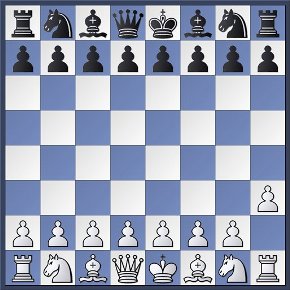
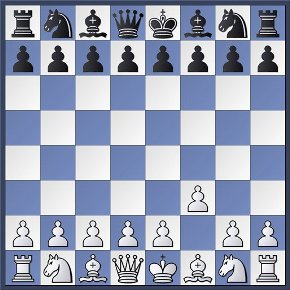
White has played 1.h3. This move is senseless and weak. It does not develop a piece and it does not get control of the center but wastes time instead. In the meantime Black will get a piece out (1…Nf6) or he will push a center pawn (1…e5) to grab space in the center and will get his pieces out afterwards. First he will get out knights and then the bishops. He will develop the kingside first and then castle quickly.
White has played f3. This is a bad move because it weakens the kingside and occupies the natural square f3, so the knight can’t go there anymore. White should have played 1.e4, 1.d4, 1.c4 or 1.Nf3 to get his pieces out afterwards and to grab space in the center.
Just use common sense. This helps.
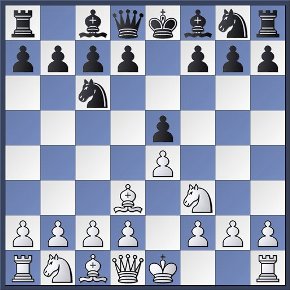

White has played Bd3. What for? This move makes no sense. It blocks the d-pawn and this disturbs the coordination flow of the white pieces. White can’t use the d-pawn anymore to control the center because it can’t move. Hey! Chess is not that difficult. White should have played the bishop to c4 where he controls d5 and pressures f7 or he could play it to b5 (Ruy Lopez) where it attacks the knight.
Second diagram: White has played the nonsense move h4. He has not developed any pieces and has not castled, but has weakened his kingside already. He can’t attack with a single pawn. This is ridiculous. He should have got a piece out instead. (Nf3)
Study commented chess games to understand how a game of chess should be played and get some good chess books here.
To understand “the truth” in Chess you should vary your chess experience. What I mean is, don’t play the same chess openings for the rest of your life. Especially if you play inferior opening moves all the time, you will lose points in the long run. This is proven by game statistics, as you cannot possibly be as successful with inferior opening setups.
Best Electronic Chess Sets and Computers
Get an Electronic Chess Board
Use X-Ray-Vision in Chess
When you analyze your chess game it is sometimes hard to see all chess combinations that are hidden within a particular position.
If you miss a hidden trap of your opponent, then you lose instantly a piece or a pawn or even worse, you might get checkmated. Or you miss a strong combination which would have won the game for you right away.
For that reason, it is a big help, if you use X-Ray-Vision in your chess games.
To apply X-Ray-Vision in chess means, that you never look at the chess pieces, but to their energy lines. If you see a knight then you visualize the squares in your mind that are controlled by this knight. But you never look at the square, where the knight is placed itself, because this square is not controlled by the knight! It just sits on it, that’s all.
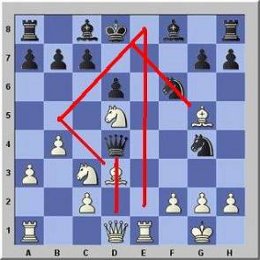 |
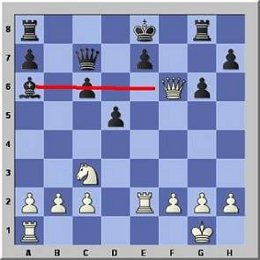 |
| If you use X-Ray-Vision here as White, you might find this difficult winning move. Re8+!! This move wins the queen and the game, as White has more material and the better position. The king in the middle will come under strong attack. 1.Re8+! KxR (the knight is pinned and can’t capture!) Now 2.Bb5+ c6 3.QxQ and White wins the queen and sooner or later the game. (Budovskis, Inesis – Atars, Pablo, 1970) | White moves and plays 1.Nxd5! cxd 2.QxB! Great isn’it? (Bobby Fischer – Predrag Ostojic 1970) |
X-Ray Vision does help you to discover hidden moves and prevent that you are running around mentally searching like a blind duck. Try it in your next games.
The first Thought – This is the most important of all Chess Tips.
After your opponent has moved, what do you think first? Many people think they are the center of the earth and that planet earth is evolving around them. They only think about themselves and in which way they can overrun the opponent. The opponent simply doesn’t exist in their minds and they only worry about their own moves and plans.
Some players might even think how great they are and that they are going to win just because they have the higher rating. This arrogant attitude will be punished in a chess game in no time at all.

If you think first about yourself and your own moves and possibilities, after your opponent has moved, then it is time to change this way of thinking completely, or you will never become a good player. You are going to lose many games just because of your attitude. Learn from the following chess tips.
After he has made his move, the right way to think is:
What is he threatening? What does he want? How can I stop his plans or at least reduce their effects on my position.
Make sure that you work out his plans or you might get into real trouble. He might threaten a fork and you see nothing or he plans a sacrifice that would destroy your kingside.
When you understand the move of your opponent completely, then you can think about your own moves and ideas.
Remember, you are not the boss in chess. What I mean is that your opponent is very important too. The game is not just evolving around you. If you just think about your own moves in a game you run right into a disaster.
Read more about chess strategy at Wikipedia
- Be a Fighter
- Don’t get into Time-Trouble as this will get on your nerves and paralyzes your mind.
- You have a strong opponent.
- The position of the game is not after your taste.
- You are sad about missed opportunities in this game.
- Don’t waste all your time trying to find the best move.
Fight on move after move and don’t play only half-hearted when you are in a bad position. If you lose heart you don’t see your saving moves because your mental abilities are reduced. If you fight on, your opponent might make a mistake because he does not expect such hard resistance. In the long run such an attitude will save half a point here and there. Instead of losing, you might make a draw or even win, because he gets tired and makes a blunder.
If you are one of those players that get into time trouble on a regular basis then you should get this problem under control.
Prepare your openings well and play the first 10 to 12 moves in just a few minutes.
Time trouble is like a disease for some players. They just can’t control it. There are psychological reasons for getting repeatedly into time trouble in tournament games.
This makes you think twice about every move he does and you check constantly everything that happens on the board. You see dangers where there is nothing at all. You have hallucinations. Your mind is blocked by fear. You can’t think properly. Because of that you rethink variations over and over to make sure that you have not overlooked something. This all costs time. Relax and forget about the opponent. It’s just a game, you don’t lose your life when you lose.
Just play your usual game. What can happen? Nothing much, you just might lose a game of chess, that’s all. Your life is not dependent on that game. If you keep that in mind you stay relaxed and play well.
You don’t like this variation at all or this whole setup. You don’t understand the position and can’t find a plan. This makes you think longer. Tell yourself mentally that this position is fascinating and that you love to find good moves.
You constantly think about it. This cost time and nerves and clouds your thinking. Tell yourself that you consider this game from now on as a completely new game and that what has happened a few moves before is not important anymore. You are going to play well from now on.
You might never find it and lose on time. Imagine how much time and energy you would need if you try to find the best move every time it’s your move.
If you see a good move, check it and have a look around if there is a better one. If not, just move and then think on your opponents time.
Grandmaster Igor Smirnov (UKR) has developed a
UNIQUE Chess Teaching SYSTEM
When you become a chess player, then chess will have a certain influence on your life and on your way of thinking.
Keep on playing, then you will understand what I mean. But there are sometimes tricks used that can upset your mental balance. Just get to know them, that will be sufficient. Don’t use them, as your opponent deserves a fair game. The following tricks are not the way a chess player should behave, don’t you think?
Read more about Chess Tricks
Your Emotions in Chess
Chess Stories
Chess Jokes
Decline early Draw Offers
Psychological Chess Tips
When you are winning …
There is a saying in chess:
Nothing is harder than winning a winning position.
If you have a winning advantage don’t let it slip away. Be patient and make good moves to secure your victory. Cut down the counter-play of your opponent. Don’t take any risks. Don’t think: Hey, my position is a sure win. No problem! If you think like that, you become arrogant and your brain is falling asleep. And it will be hard to wake it up again.
Follow these chess tips here to win more games:
When you are winning your brain is losing attention. Your alertness and your willpower are going downhill.
Just one mistake is enough and you have spoiled your winning position. You might fall into a deadly trap. It might end in a draw or you might even lose this game. Your opponent doesn’t want to lose so he will fight like hell until the bitter end. But your brain has switched off already. So don’t fall asleep! Beware of traps.
When you reach a winning position you should tell yourself:
“Hey, I am winning! I have to be very careful now. Now I must play my best chess! I must play even better than before! I have to be alert and fully awake or I lose or just make a draw.”
Don’t take every Gift in Chess
Many chess players are materialists. They take every pawn or piece that is offered to them without using their brain.
Please understand that sometimes a pawn or a piece is poisonous. It is a gift to you made by your opponent to get something else in return. For example he might get a devastating attack going at your kingside or he might win your queen by offering you a pawn.
However, when you get offered something for free in chess your alarm bell must ring! Do analyze if this gift is really free or poisoned. It’s not christmas yet!
- Get the best chess books.
- If you want to become a good chess player then get
high power chess teaching videos by Grandmaster Igor Smirnow.
The following diagram shows that you should be careful and not grab all the materal you can get. Chess is not a purely materialistic game but to get a good position is important as well.
Example: See this position below! Black moves.
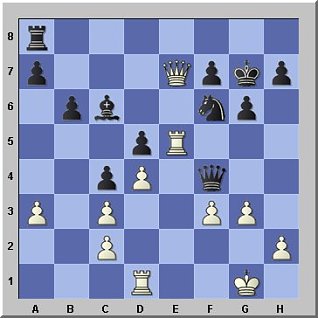
Black is winning as he is up in material. But he is greedy and captures the pawn on f3 without switching on his brain beforehand! White played Rf1 winning the knight and the game.
Defend like Hell
If you run into a bad position, defend it as good as you can. Use all your mental strength and willpower. Don’t lose hope as your opponent has probably lost some of his attention already because he knows, of course, that he is winning. It is possible that his brain has fallen asleep already, he just didn’t realize it yet. If you put up a trap he might fall right into it.
You as a defender must react to his moves and must remain wide awake. And you have to find sometimes the best move to survive. Whereas the attacker has no problems at all finding good moves, as it is easy to attack, but very difficult to defend. Especially if you have to find so called only-moves (the only move to survive).
Defending bad or even lost positions will give you a hard time. It is a normal process that you lose hope and you tend to give up. Become aware of that. Don’t lose concentration but try to hold up your willpower to find saving moves and put up dangerous traps or change the structure of the position completely, if possible. This might upset your opponents thinking.
A good defense can win a game just the same way as a strong attack. Never forget that. Don’t say to yourself: “I am losing!” This will block your thinking process and you will lose faith in your ability to hold this position. Just tell yourself: “I am going to defend this position like hell now!” “I will play my best chess now!”
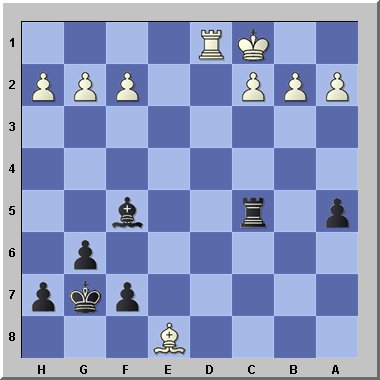
In the position above (Aleksei Suetin-Makarytschew / Open Championship/Moskow 1983) Black had played the opening badly, is a pawn down and has a losing game.
Grandmaster Suetin (White) knows that he has a winning game. His attention decreased rapidly. He had to make a move. Black is threatening Rxc2+.
Suetin just had to play something like Rd2 or Ba4 but he plays mechanically b3??. Just a few seconds later he realizes his dreadful mistake and resigns immediately.
This is just an example. Loss of attention happens among chess grandmasters as well.
Here are some chess tips that are concerning your attitude towards the game and other players.
Never get upset at your Opponent
Some chess players seem to be aggressive. They are knocking the piece on the board when making a move. They believe a move is much stronger if they place it with a loud knock. Or they press the piece very hard on the board and screw it. Don’t worry about those players as they are usually pretty weak. This is my experience. Once I had a game where the player was even reading a newspaper while playing. I was feeling getting upset, but I calmed down and concentrated on my game. Fortunately he lost.

When you have lost
It is sometimes hard to lose in chess. I am the first one to admit, but life goes on. No reason to cry. (ha-ha-ha) This sounds funny doesn’t it?
Okay, I try again:
Every player loses. This is normal. But it is not normal to worry about your loss all day long and to think about your loss while playing your next game.
When you have lost a game, have a quick look at the position to find out why you have lost, to satisfy your desire of knowing what has happened. Your opponent does often help you and might give you useful chess tips about the way you have played the position. After that go to bed or eat something, talk to friends or go for a walk. Relax. Forget this game. If you are not able to put that game aside in your mind and relax, then this game will cost more points as you might lose the next game as well because you are still upset. If you play in a tournament you need to be refreshed to play the next game.
A few days later you analyze your game and find the reason why you lost. Just learn from your mistake and never make the same mistake again. Don’t try to win the next game just because you lost the last one. This is a big psychological mistake. The next game has nothing to do with the one you lost before. You can ruin the position of the next game, just because you want to win desperately to make up for the lost game before.
If you cannot detach yourself from your loss you will lose the next game as well because your mind is not in present time. You are not wide awake, aware and fully alert because you have taken the loss personally.
Don’t take a loss personally! You are not an inferior person because you lost! You just lost a game of chess, that’s all! Forget about it! The next game is waiting.
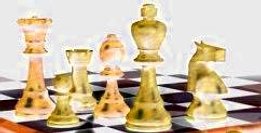
Never underestimate your Opponent
Even when your opponent is rated lower, don’t underestimate him. This is the biggest mistake you can make. Respect his strength and play your best chess. If you don’t take him seriously your brain might fall asleep and you are not attentive. You might fall into a trap and lose.
Never overestimate yourself! These chess tips will prevent that you behave like a fool.
1. Don’t think, that you are a genius and the other players are just dumb heads!
2. Don’t believe that just because you have a higher rating that you can’t lose to a much weaker player. The rating is just statistics. The player could be a young chess talent and his rating has not yet caught up with his real strength. Or you might have a bad day and your brain is not working properly. This can happen.
I tell you a little story now which will highlight this attitude:
There was a match around the year 1908 between the coffeehouse-player Burletzki (who did not follow my chess tips) and a German chess master named Koehnlein. The winner would be the player who wins the first six games.
Burletzki had great confidence in his own abilities but lost the first game.
Burletzki: “Shit! I’ve made a bad mistake.”
The second game Koehnlein won again.
Burletzki: “You can’t win them all!”
The third game Koehnlein won again.
Burletzki: “I am just in bad shape today!”
The fourth game Koehnlein won again.
Burletzki: “He doesn’t play that bad.”
The fifth game Koehnlein won again.
Burletzki: “I underestimated him!”
The sixth game Koehnlein won again.
Burletzki: “I think he plays as strong as me.”
(translated from Beheim-Schwarzbach 1953,p 265/266)
I think the best advice is useless in this case above. Chess tips don’t help here, I think. But hey? Got the idea?
____________________________________________________________
Go to Chess Tips II
____________________________________________________________
 Sick of Losing at Chess? Get Chess Courses from a Grandmaster! HUGE Discount! Click here!
Sick of Losing at Chess? Get Chess Courses from a Grandmaster! HUGE Discount! Click here!Get Chess Course -Beginners Package- from a Grandmaster! Huge Discount!
Privacy Policy Impressum/Disclosure Disclaimer Donate
© 2008- www.Expert-Chess-Strategies.com
